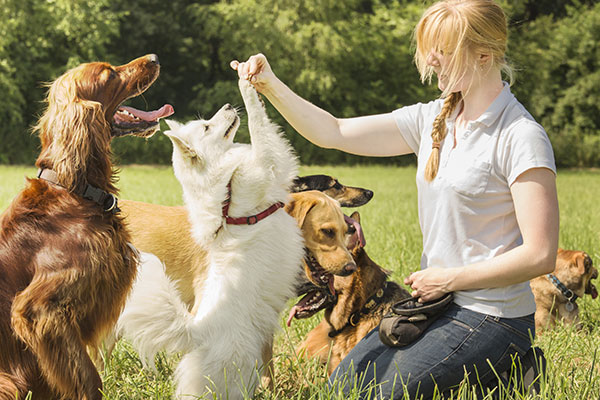When to call a board certified veterinary behaviourist for your pet
Wiki Article
Comprehending the Role of a Veterinary Behaviourist in Family Pet Training and Wellness
The function of a vet behaviourist is essential in attending to the complex relationship in between family pets and their owners. They integrate veterinary medication with insights from animal behavior scientific research to deal with concerns like hostility and stress and anxiety. Unlike traditional instructors, their method focuses on the underlying root causes of these behaviors. This nuanced viewpoint increases questions concerning the effectiveness of conventional training techniques and how a much deeper understanding can transform pet well-being. What approaches do they utilize to achieve these outcomes?What Is a Vet Behaviourist?
A vet behaviourist is a specialized specialist who concentrates on understanding and addressing the behavioral issues of animals, particularly pets. Their experience combines vet medicine and pet actions scientific research, allowing them to identify and deal with a vast variety of behavior problems - dog behaviourist near me. These professionals usually hold postgraduate degrees, such as a Master's or PhD in animal habits, and are certified by pertinent organizations, guaranteeing they possess a deep understanding of pet psychologyVeterinary behaviourists analyze animals via detailed observation and evaluation, considering variables such as genetics, environment, and training background. They establish customized therapy strategies, which may consist of desensitization techniques, positive support methods, and ecological adjustments. Collaboration with family pet proprietors is essential, as they offer advice and assistance throughout the training process. Eventually, the objective of a vet behaviourist is to improve the wellness of the animal while cultivating a harmonious relationship in between family pets and their owners.
The Importance of Understanding Pet Habits
Understanding pet habits is important for both family pet proprietors and experts in the area of pet treatment, as it lays the foundation for reliable interaction and training. Identifying just how pets regard their setting and respond to stimulations enables caregivers to create a much more harmonious living situation. Insight into behavior cues, such as body movement and vocalizations, fosters stronger bonds in between pet dogs and their proprietors. By valuing the all-natural reactions and demands of various types, individuals can tailor their training approaches to accommodate these factors, promoting better knowing and teamwork. Furthermore, a solid grasp of behavior scientific research help in determining stressors and possible triggers, permitting positive treatments. In general, understanding animal behavior not only boosts the wellness of pets yet additionally improves the experiences of those who look after them, ultimately bring about healthier, better connections.Common Behavioral Issues Resolved by Veterinary Behaviourists
Vet behaviourists regularly attend to usual behavior issues in family pets, including hostility and anxiety actions. They additionally focus on anxiousness and tension monitoring, which can substantially affect a pet's well-being. Understanding these problems is vital for creating effective training and intervention approaches.Hostility and Fear Actions
While numerous pet dog proprietors might see aggressiveness and concern actions as easy behavioral issues, these intricate responses typically come from underlying anxiousness or past trauma. Veterinary behaviourists play a necessary duty in identifying the source of these habits, which can materialize in different kinds, consisting of growling, attacking, or too much fear of certain situations. Understanding these triggers is important for establishing efficient training methods customized per pet's distinct situations. Behaviourists utilize techniques such as desensitization and counter-conditioning to aid pets handle their fears and hostility. Furthermore, they inform family pet owners about suitable management strategies, stressing the relevance of perseverance and uniformity. Resolving aggressiveness and concern actions not only improves the pet's lifestyle yet likewise enhances the bond between pet and proprietor.Anxiousness and Stress Administration
Anxiety and tension prevail issues that many family pets deal with, commonly resulting from changes in their setting, lack of socialization, or previous adverse experiences. Veterinary behaviourists play an important role in recognizing the underlying sources of these issues. They use different techniques, consisting of behavior modification, desensitization, and counter-conditioning, to aid pet dogs take care of anxiousness. In addition, they might advise ecological changes, such as developing safe rooms or offering enrichment activities that advertise relaxation. Collaboration with pet dog proprietors is necessary, as behaviourists assist them in understanding their pet dog's signals and carrying out effective coping approaches. By attending to anxiety and stress and anxiety, vet behaviourists contribute substantially to enhancing the overall health and high quality of life for pets and their households.How Veterinary Behaviourists Vary From Typical Fitness Instructors
Vet behaviourists differ from standard fitness instructors largely in their educational backgrounds and training. While standard instructors commonly concentrate on obedience and basic commands, veterinary behaviourists highlight understanding and addressing underlying behavioral problems, integrating clinical factors to consider right into their approach. This distinct focus enables them to supply an extra thorough treatment for animals with complicated behavior obstacles.Education And Learning and Training Distinctions
Recognizing the difference in between vet behaviourists and traditional trainers is important for animal owners seeking efficient training options. Vet behaviourists have postgraduate degrees in vet medication, usually adhered to by specialized training in pet practices. This education and learning outfits them to resolve complex behavioral concerns that might originate from medical problems or psychological aspects. On the other hand, conventional trainers generally have certifications from training programs that concentrate on obedience and standard commands without diving into the underlying emotional or clinical elements. While both experts aim to boost family pet behavior, veterinary behaviourists can detect and treat behavioural troubles holistically, incorporating medical expertise right into training methods. This crucial distinction highlights the value of picking the appropriate professional based on the pet's details demands.Concentrate On Behavioral Issues
Dealing with behavioural problems requires a nuanced strategy that differentiates veterinary behaviourists from standard trainers. While typical fitness instructors frequently concentrate on obedience and basic commands, vet behaviourists explore much deeper into the underlying sources of problematic behaviors. They employ an extensive understanding of pet psychology and therapy techniques, which are rooted in clinical research. This expertise enables them to recognize issues coming from anxiety, worry, or aggressiveness, instead of simply addressing surface-level signs. Furthermore, veterinary behaviourists examine the Read Full Report pet's general health, considering ecological factors and the animal's background. By integrating medical expertise with behavioral techniques, they supply tailored options that advertise lasting behavioral change, guaranteeing both the family pet's and proprietor's top quality of life are significantly boosted.Clinical Factors To Consider Consisted Of
While traditional trainers may neglect underlying medical problems, veterinary behaviourists prioritize a complete analysis of a pet dog's health as a foundational step in addressing behavioral troubles. This approach allows them to identify potential medical conditions that might add to unwanted practices, such as anxiousness, pain, or neurological problems. By incorporating medical examinations into their method, veterinary behaviourists can collaborate with vets to assure an all natural understanding of the family pet's wellness. Additionally, they can recommend appropriate therapies or modifications to training plans based on clinical searchings for. This substantial point of view distinguishes vet behaviourists from typical fitness instructors, as they deal with both behavioural and health-related variables, eventually resulting in much more effective and sustainable end results for pet dogs and their proprietors.The Refine of Working With a Vet Behaviourist
Collaborating with a vet behaviourist includes an organized technique to addressing a family pet's behavioral concerns. Initially, the procedure starts with a comprehensive analysis, where the behaviourist gathers in-depth details regarding the pet dog's history, atmosphere, and details behaviors that are problematic. This normally consists of sets of questions, interviews with the animal owner, and often monitorings of the pet dog in its environment.Complying with the evaluation, the vet behaviourist formulates a tailored intervention strategy that might consist of behavioral modification strategies, training techniques, and, if required, referrals for medical evaluations. cat behaviourist near me. The strategy is created to be functional and attainable, making certain that it fits flawlessly right into the family pet owner's way of living
Subsequent follow-up sessions are important to check development, adjust approaches, and supply support. This joint effort not just intends to modify undesirable habits but additionally to improve the overall health of the animal, guaranteeing a harmonious connection between the pet dog and its owner.
Enhancing Your Pet dog's High quality of Life Through Behavioral Assistance
Enhancing a pet's lifestyle with behavior assistance is important for fostering a healthy and balanced and fulfilling relationship in between animals and their proprietors (veterinary behaviour). Veterinary behaviourists play an essential function in recognizing and dealing with behavior concerns that may impede a pet dog's well-being. With customized strategies, they assist relieve anxiety, worry, and aggressiveness, ultimately promoting a much more well balanced and satisfied petBehavioral assistance incorporates numerous techniques, including positive support, ecological enrichment, and socializing. By implementing these methods, proprietors can develop a caring setting linked here that encourages positive behaviors. This not only enhances the family pet's emotional health and wellness yet also strengthens the bond between family pet and proprietor.
Furthermore, normal consultations with a veterinary behaviourist guarantee that any emerging behavioral concerns are promptly addressed, avoiding acceleration. In general, purchasing behavioral support is a proactive approach that greatly improves a pet dog's life, bring about boosted physical and psychological health and wellness results.
Frequently Asked Concerns
What Qualifications Do Veterinary Behaviourists Possess?
Vet behaviourists typically hold a veterinary level, adhered to by specialized training in pet habits. Numerous also have qualifications from acknowledged organizations, demonstrating their knowledge in addressing pet habits problems and advertising total animal well-being.Can Vet Behaviourists Recommend Drug for Animals?


Veterinary behaviourists, having veterinary degrees and specialized training, can undoubtedly suggest medication for family pets. This capacity allows discover here them to attend to underlying behavior issues efficiently, commonly combining pharmacological treatment with behavior alteration techniques for finest end results.
How Long Does Behavior Modification Commonly Take?
Behavior modification duration varies significantly, commonly ranging from a few weeks to a number of months. Variables influencing this timeline include the animal's certain concerns, consistency of training, and the owner's involvement at the same time.Are Remote Consultations Offered With Veterinary Behaviourists?

Just how much Does a Veterinary Behaviourist Appointment Expense?
The cost of a vet behaviourist assessment typically varies from $100 to $300, depending upon factors such as place, experience, and session length. Additional charges may obtain follow-up appointments or specialized services.Report this wiki page